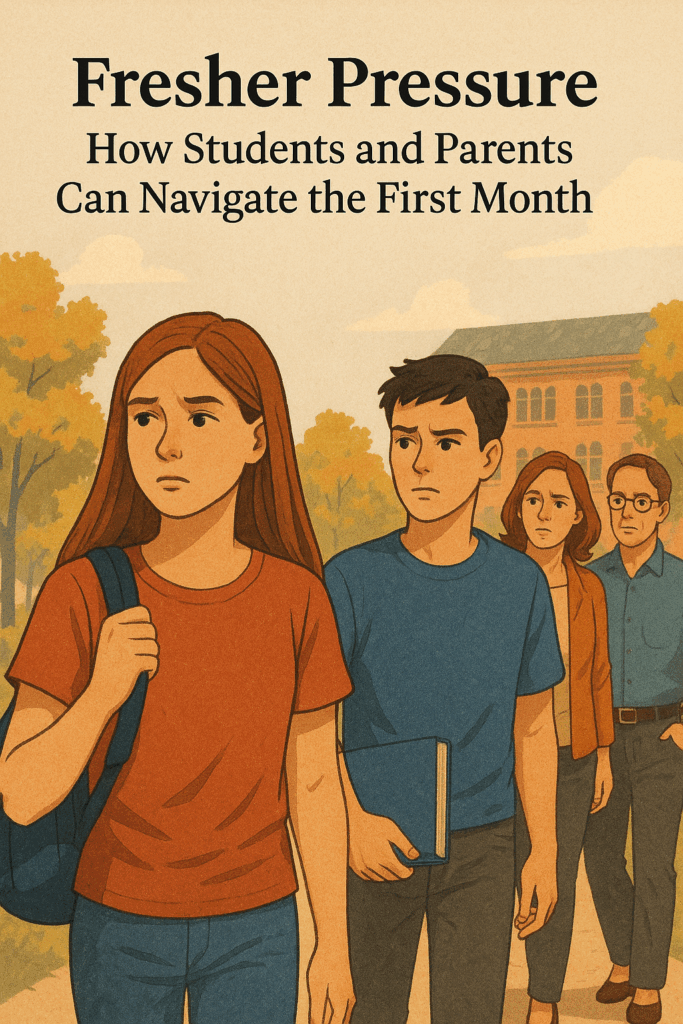Fresher Pressure: How Students and Parents Can Navigate the First Month

Freshers Week is painted as a rite of passage, a blur of parties, instant friendships, and the beginning of “the best years of your life.” For many, though, the reality looks very different. Beneath the Instagram highlights and glossy brochures, the first few weeks at university can feel overwhelming, lonely, and confusing.
This isn’t failure. It’s transition. And just as students are finding their way, parents and carers are learning a new role too: stepping back, letting go, and offering steady support from a distance.
Freshers Week is not just about settling into a timetable, it’s about finding belonging, building resilience, and realising that growth comes through uncertainty.
The Reality Behind the Hype
Before stepping onto campus, most young people carry an image of university life: lively flat dinners, late nights with new best friends, societies that feel like second families. But the lived reality often looks different in those early weeks.
- Expectation vs. reality. Many students imagine instant belonging, and when it doesn’t happen, they feel as if something is “wrong” with them.
- Shifting identity. Moving away from the structures of school, family, and hometown friends can shake a young person’s sense of who they are.
- Loneliness in the crowd. Being surrounded by hundreds of new faces doesn’t mean feeling connected. The mix of social exhaustion and quiet evenings alone can be jarring.
- The small stressors. Struggling with Wi-Fi, losing track of spending, navigating laundry and shopping, all the practical adjustments can weigh heavily when combined with social pressure.
The first truth every student and parent needs to know is this: if it feels messy, you’re not doing it wrong. You’re navigating change.
For Students: Finding Your Anchors
The pressure to “smash Freshers” is unhelpful. What matters is not winning at social life, but building small anchors that keep you steady in the swirl of change.
- Build daily basics. Prioritise three things: move your body, fuel yourself properly, and get fresh air. These simple actions protect both physical and mental wellbeing.
- Use the 10-minute rule. Nervous about a society event or lecture? Promise yourself ten minutes. If it’s awful, you can leave. More often than not, you’ll find your footing.
- Celebrate small wins. Cooking your own meal, chatting to one new person, or emailing a tutor, these are victories. Growth is built from consistent steps, not dramatic leaps.
- Choose authenticity. Not every event will suit you. Don’t feel pressured to enjoy what others enjoy. Finding your people is about alignment, not performance.
Above all, remember that friendships are not instant. They are formed gradually, through repeated encounters, shared laughs, and ordinary routines.
For Parents and Carers: Becoming the Steady Base
Parents often feel helpless during Freshers Week. You’ve spent years protecting and guiding, and suddenly your role changes. Support is still needed, but in new, lighter ways.
- Keep contact gentle and predictable. A simple “thinking of you” message each day is more grounding than constant questions.
- Normalise the wobble. Reassure your young person that dips in mood, loneliness, and self-doubt are part of the process. They are not signs of failure.
- Empower, don’t rescue. Celebrate the skills they are building: budgeting, cooking, sorting problems themselves. Ask “What helped today?” rather than “Are you sure you’re okay?”
- Be the calm voice. Students often borrow their parents’ tone. If you stay steady and reassuring, they’ll find it easier to stay balanced too.
The hardest part of parenting a fresher is resisting the urge to fix everything. Trust that your calm presence, even at a distance, is one of the strongest supports they’ll ever have.
The Four-Week Journey
It helps to see the first month as a journey with phases.
- Week 1: The Rollercoaster. Excitement collides with exhaustion. The goal isn’t to feel settled but simply to explore and take things in.
- Week 2: The Comparison Crunch. Everyone seems to have found their group. In reality, most are still finding their feet. Loneliness here is common and temporary.
- Week 3: The Friction. The newness wears off. Flatmates irritate, routines slip, coursework begins to bite. This is the time to practice problem-solving and self-care.
- Week 4: The Green Shoots. Familiar faces reappear, a sense of rhythm emerges, and confidence grows. Small connections begin to feel like community.
When parents and students expect these phases, the dips feel less alarming and the rises more rewarding.
Signs That Extra Support May Be Needed
Some struggles are expected. But there are times when parents and students should consider seeking additional support:
- Withdrawing from most activities for long periods.
- Persistent distress or severe sleep disruption.
- Expressing hopelessness or harmful thoughts.
In these moments, universities have wellbeing services, tutors are trained to help, and GPs can provide support. Asking for help is not weakness, it’s strength in action.
A Shared Path Forward
Freshers Week isn’t a competition. It isn’t a highlight reel to be measured against others. It is the first draft of independence, messy, uncertain, and ultimately transformative.
For students: remember you’re not behind. You are beginning. Each day you step out, cook a meal, or try something new, you’re building the life you came here for.
For parents: your calm faith, your light touch, and your quiet encouragement give your young person the strength to keep moving forward.
Freshers isn’t about proving yourself. It’s about becoming yourself, slowly, imperfectly, and authentically. And that’s a pressure worth embracing.
